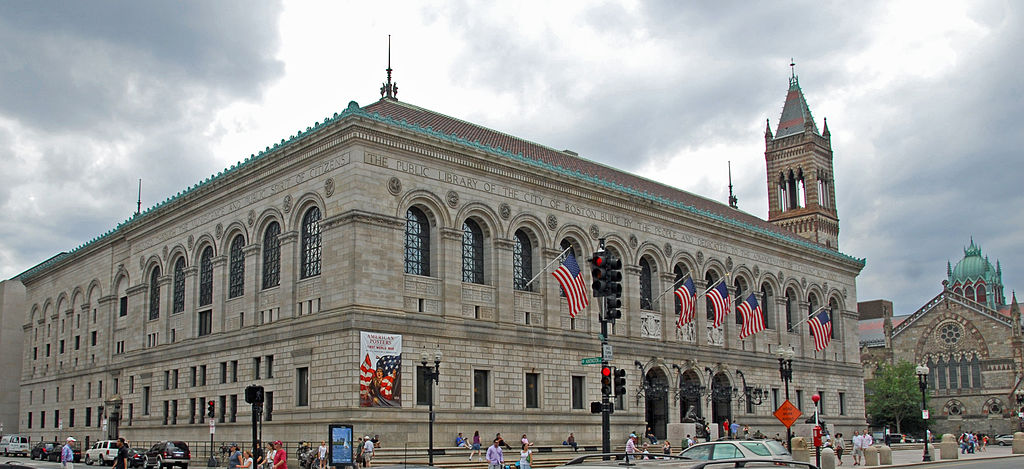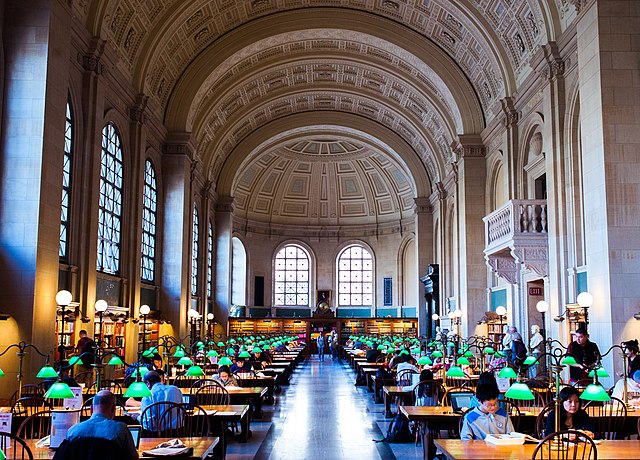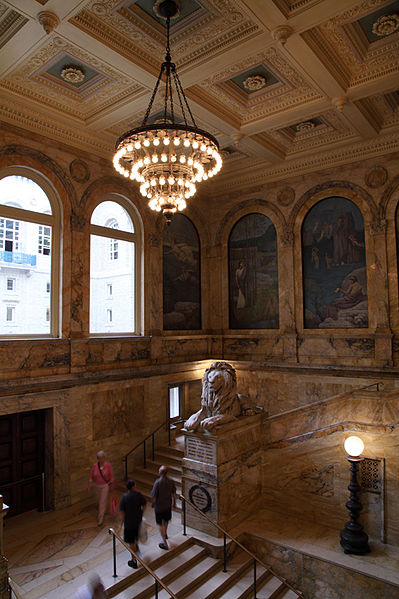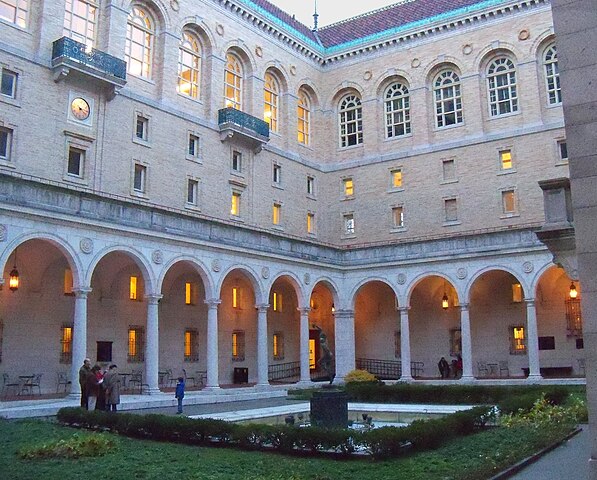
Boston Public Library
The Boston Public Library (BPL) was founded in 1848 as the first large free city library in the United States. Its first building was a former schoolhouse opened to the public in 1854, crowded with about 16,000 books. The present historic building has been open since 1895, after the American architect Charles Follen McKim created what he called a palace for the people. In 1986, the U. S. National Park Service termed the McKim Building a National Historic Landmark for its mural paintings, rare books and manuscripts, maps, and prints. Today it houses about 23 million items, including first editions by William Shakespeare, original music handwritten by Wolfgang Amadeus Mozart and the personal libraries of such notable Americans as John Adams, the second president of the United States. With two dozen branches, the library has almost 4 million individual visits annually, while its website has about 8 million hits per year, with almost 4 million books and audiovisual items borrowed or downloaded. Among the details most admired by visitors are murals by the French artist Pierre Puvis de Chavannes, offering symbols of poetry, philosophy, and science, among other images. In another area, the American artist Edwin Austin Abbey painted murals inspired by the story of King Arthur and the knights of the Round Table. There are also celebrated murals painted by the American artist John Singer Sargent about the development of world religions. These artworks make the library like a museum to be visited for its beautiful objects, as well as a research center. When the architect McKim prepared his design, he was inspired by the example of a great French library, the Bibliothèque Sainte-Geneviève in Paris designed by Henri Labrouste in the mid-1800s, as well as earlier plans by the Italian Renaissance architect Leon Battista Alberti. Monumental inscriptions are craved into the building on each side. On the east, the inscription reads:
THE PUBLIC LIBRARY OF THE CITY OF BOSTON • BUILT BY THE PEOPLE AND DEDICATED TO THE ADVANCEMENT OF LEARNING • A.D. MDCCCLXXXVIII.
On the north, the message is
THE COMMONWEALTH REQUIRES THE EDUCATION OF THE PEOPLE AS THE SAFEGUARD OF ORDER AND LIBERTY.
Above the central entrance is a message of welcome:
FREE TO ALL.

Collection highlights
The sheer size of the BPL research collection may surprise visitors from Thailand. It contains almost 2 million rare books and manuscripts, including musical archives and a special collection devoted to Daniel Defoe, the author of the novel Robinson Crusoe. On its website, the BPL notes that in the fiscal year 2014, over 26,000 digital magazines were borrowed, in a program that started in 2013, and there were more than 7,500 checkouts of streaming media. Almost 75,000 Massachusetts residents signed up for library cards for the first time. While the Central Library completed a renovation last year, Immigrant Information Corners were opened in all the library branches to provide information about resources and services available to help the city’s immigrant residents. An ambitious digitization project continued, with almost 250,000 historic photographs, maps, manuscripts, books, and other artifacts added to DigitalCommonwealth.org, where they may be viewed online. The Rare Books Department dealt with an outbreak of mold in 2015, closing to the public for two months for a thorough cleaning to resolve the situation. Restoration of the painting representing philosophy by Puvis de Chavannes was also accomplished. In 2015, the library circulated over 1 million digital titles including ebooks and e-audio books. The BPL added followers to its active Instagram; Facebook; and Twitter accounts.

Thailand and the United States of America:
Exchange opportunities for Thai students and young professionals.
Among the many ongoing programs in cultural and educational exchange between the Kingdom of Thailand and the United States of America is a Study of the U.S. Institutes for Student Leaders. According to information available on the website of the U. S. Embassy in Bangkok,
Study of the U.S. Institutes (SUSIs) for Student Leaders are five- to six-week academic programs for foreign undergraduate students between the ages of 18 and 25 designed to improve their understanding of the United States and to develop their leadership skills. Institutes include a four-week academic residency consisting of interactive classroom activities, discussions, lectures, readings, site visits, and workshops; one week of educational travel to a different region of the United States; leadership skills building activities; community service; and opportunities to interact with their American peers on a college campus. Each Institute includes approximately 20 participants from selected countries. In 2017, the following themes will be offered for a total of 19 student leader programs:
- Civic Engagement
- Environmental Issues
- Local, State, and Federal Public Policymaking
- Religious Pluralism in the United States
- Social Entrepreneurship
- S. History and Government
- Women’s Leadership
Students between the ages of 18 and 25 with at least one semester left of college or university may qualify. They should have demonstrated leadership through academic work, community involvement, and extracurricular activities, and must have adequate skills in reading, writing, and speaking English. They should also have little or no previous travel or study experience in the United States, since the point of the program is to introduce America to students who would not ordinarily get to travel there. Candidates cannot be U.S. citizens or permanent residents, and they must be eligible to receive a United States J-1 visa. A J-1 visa is a non-immigrant visa issued by the United States to research scholars, professors and exchange visitors participating in programs that promote cultural exchange. All applicants must meet eligibility criteria, English language requirements, and be sponsored either by a university, private sector or government program. J-1 visitors may remain in the United States until the end of their exchange program, as specified on form DS-2019. Students who might be interested in applying for this program should contact the the Media and Cultural Section of the U.S. Embassy in Bangkok at GPF Wittayu Tower A, 10th Floor, 93/1 Wireless Road, Bangkok. The phone number of the Cultural and Educational Affairs Office is (66)(2) 205-4625.

For graduate students and postgraduates, another opportunity especially for Thais as members of the ASEAN community might be the Young Southeast Asian Leaders Initiative (YSEALI) Professional Fellows Program. As the embassy website indicates, The YSEALI Professional Fellows Program is a professional development exchange program for the best and brightest community leaders from ASEAN, working in the fields of civic engagement, NGO management, economic empowerment, governance, legislative process, environmental and natural resources management. The YSEALI Professional Fellows Program provides participants a month-long fellowship at U.S.-based non-profit or other organizations, government offices or legislative bodies. Fellows will work with community leaders to enhance their practical expertise, leadership skills and professional contacts to address issues in their home communities. Contact details and opportunities to sign up for updates are available on the YSEALI website. As the website states, the goal of YSEALI is
to strengthen leadership development and networking in ASEAN, deepen engagement with young leaders on key regional and global challenges, and strengthen people-to-people ties between the United States and young Southeast Asian leaders.
For one month, community leaders aged from 25 to 35, currently employed and with at least two years of professional experience at the time of application, may visit the United States to study economic empowerment, environmental sustainability, legislative process and governance, and NGO development/civil society. To be eligible, applications should have made an impact in their community, institution or company, speak and write English acceptably, and be a citizen and current resident of the ASEAN community. Good luck to all applicants!
(All images courtesy of Wikimedia Commons)

